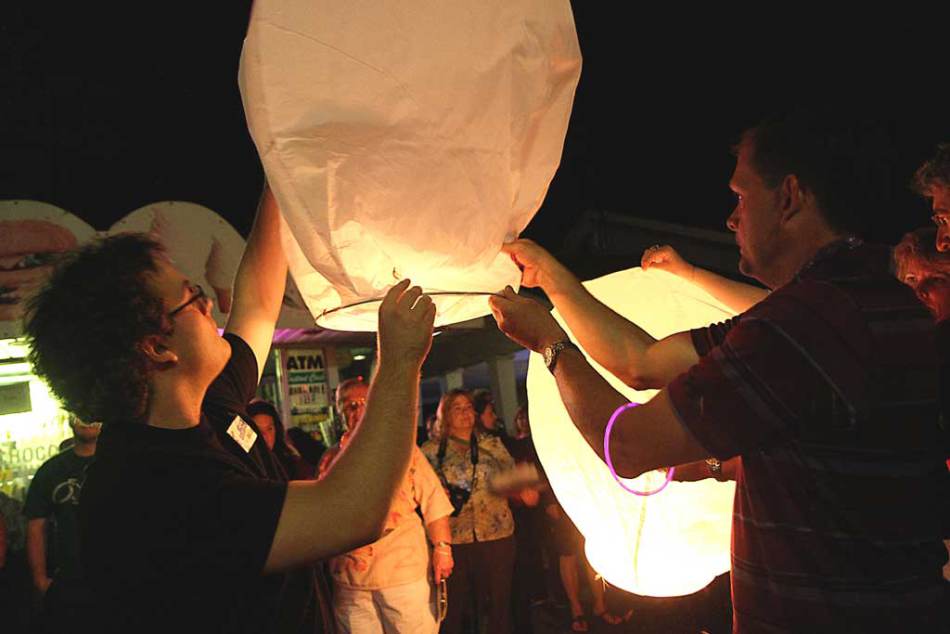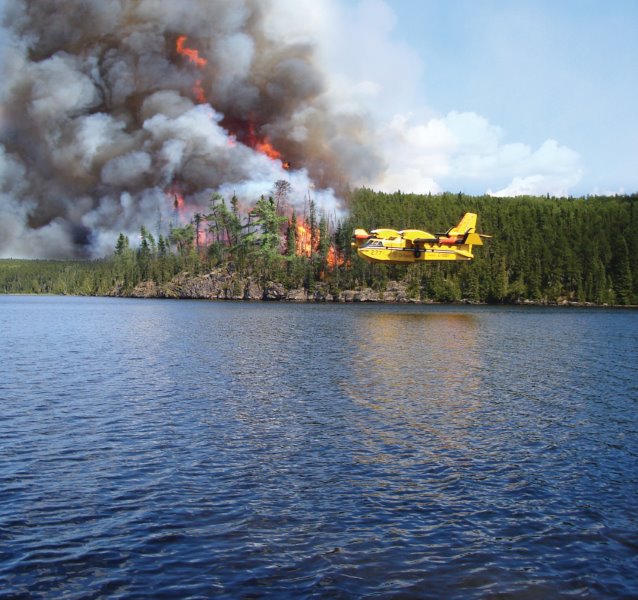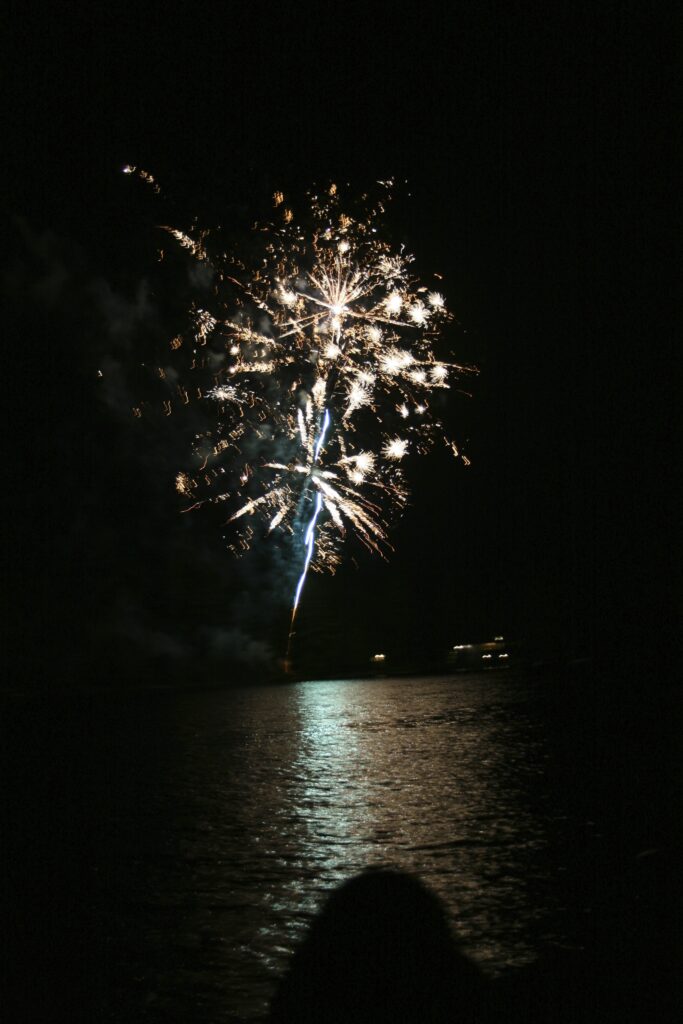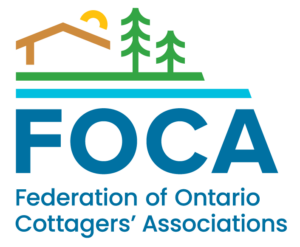
Fireworks restrictions are common in urban areas; however, over recent years several cottage country municipalities have begun to consider (or have implemented) fireworks bylaws to control their use on Ontario’s waterfronts.




images above: (left) courtesy Jessica Schaer, Public Fire and Life Safety Educator, Grey Highlands Fire & Emergency Services; (middle) courtesy Aviation, Forest Fire, and Emergency Services of the Ontario Ministry of Natural Resources and Forestry; (right) courtesy Kay Soares.

FOCA encourages everyone to follow local fireworks bylaws (see below), and to learn more about personal fire safety and fire prevention.
Flying Lanterns (also known as “sky lanterns” or “fire lanterns”) are not safe in cottage country at any time! Learn more about the dangers of flying lanterns, below.

June 2023 – with large parts of Ontario under a provincial Restricted Fire Zone (RFZ), does that mean fireworks are prohibited?
The answer is: it depends. Fireworks are not automatically prohibited under a provincial RFZ, but if your municipality has also declared a fire ban, fireworks are not permitted. Failing to comply with a fire ban could cost you dearly; fines are set by each municipality, but can run into the thousands of dollars.
FOCA’s advice: with fire fighting resources so stretched and (notwithstanding some recent, spotty precipitation) conditions are still favourable for fuel ignition in the forest, that open fires, and sending fire airborne in wooded areas is not recommended and should be avoided until conditions (and the resources available to respond to any fires) become more favourable.
We know fireworks can be an important social event. But this is an opportunity for community- and safety-minded people and organizations to do the right thing and defer the fun until it makes sense to do so.
June 29, 2023 – Some Canada Day fireworks going ahead despite regional fire ban (CBC)
June 2023 – Enjoy a “quiet fireworks” display this long weekend (Cottage Life)
July 2022 – Do loons react to fireworks? (Cottage Life)
August 2018 – Are fireworks part of a fire ban? The answer depends on where you are. (CTV News)
The following list of rural municipal fireworks by-laws is not comprehensive, but is intended to present a range of options being utilized in different regions:
August 11, 2022 – No exceptions to Muskoka Lakes fireworks prohibition bylaw (South Muskoka Doppler Online)
March 2022 – the Township of Muskoka Lakes has updated their Fireworks bylaw, after soliciting public input in a survey last Fall. The new Bylaw permits fireworks only on certain holidays weekends, between dusk and 11:00pm. The previous by-law allowed private fireworks display to be set off 7 days a week, with a permit required from the Fire Department for displays from Sunday-Thursday only.
Sept. 2020 – the Municipality of Huron Shores has posted online tips for fireworks safety
Sept. 2020 – Kawartha Lakes could ban fireworks except on summer holidays (mykawartha.com)
July 2020 – Seguin Township has passed a bylaw prohibiting flying lanterns, and restricting residential fireworks to certain fire rating levels; all commercial fireworks require a permit. (see related news item, when the bylaw was just a draft: ParrySound.com news item)
June 2020 – the Municipality of Hastings Highlands announced new restrictions on fireworks within the Municipality. More information can be found in the Bylaw Poster created by Hastings Highlands.
January 2020 – the Municipality of Highlands East seeks public input on a draft fireworks bylaw expected to go before Council in February 2020. Click here for the Municipal web notice that includes a link to a poll about restrictions or a total ban of fireworks; add your comments by 9:00am, February 3, 2020. In a related media story, Fire Chief Chris Baughman notes input has been received from cottage associations in the area.
November 2019 – in British Columbia, council has voted in a motion to ban the sale of fireworks in the City of Vancouver. The ban could come into effect by 2021, although it would not apply to display fireworks (designed to be used by professionals) and exemptions might also be made for large public events like New Year’s Eve. Last year, Vancouver firefighters compiled data that suggested the average annual fire loss per year due to fireworks is $379,000. Read more in this CTV News report.
October 2019 – an Open-Air Burn & Fireworks By-law has been approved by the Municipality of Trent Lakes. Fireworks are now restricted to specific days and times (New Year’s Eve, Canada Day, the Civic Holiday and Labour Day weekends). Flying lanterns are also prohibited in Trent Lakes as are any type of fireworks during a Burn Ban. Download the Trent Lakes By-Law (PDF, 2 pages)
May 2019 – a Fireworks By-law was approved by the Municipality of Dysart et al, prohibiting and regulating the sale and setting off of fireworks, stating that “fireworks have the potential to pollute air and water, negatively impact wildlife in the vicinity and diminish quality of life for some residents.” Under the by-law, fireworks are restricted to four holidays during the year (New Year’s Eve, Victoria Day, Canada Day and Civic Holiday weekends). Flying lanterns are also prohibited to be ignited, released, or set off into the air ignited. The by-law outlines $300-500 set fines for related offences. Download the Dysart By-Law (PDF, 6 pages)
January 2017 – the Township of Nipissing enacted a Fireworks By-law, requiring a permit from the township, and prohibiting the discharge of any fireworks during burn bans, after 11pm, or by anyone who is not the registered owner of the land where fireworks are discharged. Flying lanterns are prohibited. Fines for fires set as a result of fireworks are also outlined in the by-law. Download the Nipissing By-Law (PDF, 3 pages)
2016 – the Township of Muskoka Lakes distinguishes between Consumer Fireworks discharged for Private Display (allowed without a permit on Fridays and Saturdays only) and those for Public Display (which always require a permit). Flying lanterns are prohibited. No fireworks during a burn ban. No fireworks after 11pm. Download the Muskoka Lakes by-law (PDF, 3 pages)
2012 – the Township of Oro-Medonte requires a licence or permit for the sale or discharge of fireworks. Discharge is prohibited during burn bans. A permit is NOT required to discharge consumer fireworks on four days: Victoria Day, Canada Day, New Year’s Eve and New Year’s Day, at particular times. Link to the Oro-Medonte webpage about fireworks.
About Flying Lanterns
The article below was written by:
Jessica Schaer, Public Fire and Life Safety Educator, Grey Highlands Fire & Emergency Services


Flying Lanterns, also commonly referred to as sky lanterns or Chinese lanterns, have been traditionally used in Asia and elsewhere to celebrate festivities. In recent years many North Americans have adopted the tradition of releasing flying lanterns as a symbolic way of expressing good luck, or as celebration at weddings and other events. However, growing concern about their potential fire hazard has led to growing bans.
Flying lanterns are traditionally constructed from oiled rice paper on a bamboo frame, and are propelled by the heat of a small candle or waxy fuel cell. When lit, the flame heats the air inside the lantern lowering its density which in turn causes it to float, similar to a hot air balloon. This lanterns modern design sold online and at retail stores, features a lightweight metal frame enables it to reach heights of 1,000 feet with flight times of 15 to 20 minutes. The sky lantern is only airborne as long as the flame stays alight, after which it descends to the ground.
The risk exists when these lanterns return to the ground still alight. The lantern by its very design is flammable, so the potential for fire is imminent especially if the lantern land on flammable vegetation, forests, or structures. This threat multiplies especially when these lanterns are set off en mass as they are often done at weddings and other events to enhance the visual effect. Though its frame may burn out within seconds, the flame source (a thick waxy substance or candle) remains lit well beyond impact with the ground . Their uncontrolled and unpredictable flight path means that the lanterns can land anywhere and has been the culprit for numerous forest, field, and house fires worldwide. The danger does not stop there. These lanterns have also been reported to cause delays at airports as they pose a threat to aircrafts and reduce pilot’s visual. Farmers have also attributed numerous deaths of cattle after their livestock ingest the remnant frames of these lanterns.
As a direct result, several countries including Austria, parts of Germany, the UK, Argentina, Chile, Colombia, Brazil and Australia have banned the sale and possession of these lanterns and penalties range from hefty fines to 3 years jail time. Several U.S. States have also restricted or limited their use. It’s only a matter of time before similar bans are placed in Canada. In fact, based on these concerns the Ontario Fire Marshal issued Fire Marshal’s Communiqué 2009 – 07 to inform department officials and the public regarding this product and its related fire safety concerns. The OFM has also written Health Canada’s Consumer Product Safety Bureau to request necessary actions a re made to prevent this product from being sold in Canada. In the meantime, Fire Departments
exercise provisions under the Fire Code [Division B, Sentence 2.4.4.1.(3), or Article 2.4.4.3 or Article 2.6.3.4.] as well as through inspection orders as applicable.
The Municipality of Grey Highlands Fire Chief Rod Leeson urges member of the community to refrain from the purchase and use of flying lanterns, and requests retailers to comply in removing them from their shelves.
For enquiries regarding the Flying Lantern and potential fire hazards, please contact: Jessica Schaer, Public Fire and Life Safety Educator (519) 986-1216 Ext. 236.
June 2019: the Municipality of Dysart et al has banned the use or sale of flying lanterns, and the by-law limits the release of fireworks to certain holiday weekends. See above, or visit: https://www.dysartetal.ca/13277/ for details.
May 2017: the Municipality of Hastings Highlands has banned the use or sale of flying (“sky”) lanterns. Read the notice here… (PDF, 1 page)
October 2015: the City of Kawartha Lakes has banned flying lanterns. Read the news release here…
Flying lanterns a fire hazard for cottages (Cottage Life)
FOCA asked the Office of the Fire Marshall (OFM) about flying lanterns. The OFM has made two news releases on the subject: 2012-13 and 2009-07 when the issue first came on their radar and OFM informed fire departments about the products.
Have you had an incident with a flying lantern? The OFM encourages you to complete a Health Canada Consumer Incident Report Form or send an email to the Surveillance Coordination Unit of CPSD’s Risk Assessment Bureau at HECSB_CPSD_RAB_SCU@hc-sc.gc.ca.
Read below for what some municipalities have done to ban the use or sale of flying lanterns:
June 2019 – the Municipality of Dysart et al has banned the use or sale of flying lanterns, and the by-law limits the release of fireworks to certain holiday weekends. See above, or visit: https://www.dysartetal.ca/13277/ for details.
May 2017: the Municipality of Hastings Highlands has banned the use or sale of flying (“sky”) lanterns. Read the notice (PDF, 1 page)
October 2015: the City of Kawartha Lakes has banned flying lanterns. Read the news release
FOCA asked the Office of the Fire Marshall (OFM) about their stance on flying lanterns. OFM has made two news releases on the subject: read 2012-13 and 2009-07 (when the issue first came on their radar and OFM informed fire departments about the products).
Have you had an incident with a flying lantern? The OFM encourages you to complete a Health Canada Consumer Incident Report Form or email the Surveillance Coordination Unit of CPSD’s Risk Assessment Bureau: HECSB_CPSD_RAB_SCU@hc-sc.gc.ca.
